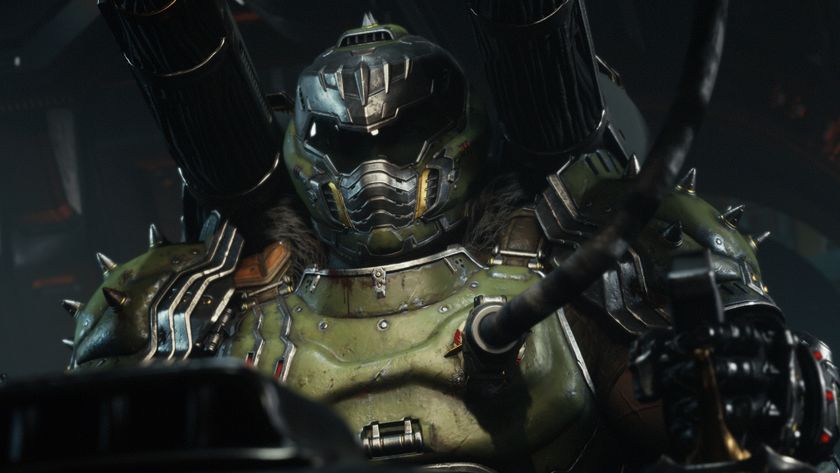Gaming's most beautiful deaths

Death is beautiful
Video games are like a prism. When you shine certain ideas through them you get a kaleidoscopic effect, often exciting, occasionally uplifting, sometimes depressing. Historically, the majority of concepts we've seen refracted through video games are ones like 'combat' or 'power fantasy', but as the medium becomes democratized, we're getting a richer and richer panoply of themes and images and messages. Games as a medium are uniquely versatile and flexible, and it's nice to see artists capitalize on that nearly unlimited potential to express and engage, provoke deep thought and genuine feeling.
To celebrate games growing up and spreading out, I wanted to look at what happens when you shine denser, more complex ideas through them, and there are few ideas I could think of more tangled with meaning than beauty and death.
Spoilers ahead for games from the previous console generation or earlier.
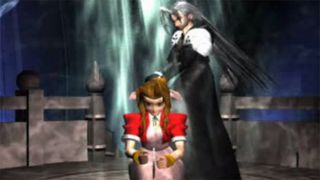
Aerith (Final Fantasy 7)
One of the most famous deaths in video game history, Aerith's is also one of the earliest examples of a main character's demise having any real emotional resonance. For a lot of gamers, Aerith's death was transformative, changing death from a temporary obstacle to a meaningful plot device. Suddenly, video game characters were mortal, vulnerable the way characters in other media were.
All the phoenix down and restorative magic on the planet couldn't save Aerith, and her demise, beyond being a tragic, beautiful moment, prompted important conversations about the player's role in storytelling and character death. It's a conversation we're still having today, debating the importance of player agency versus the license of storytellers to shape events, and the catalyst for much of it was one blow from Sephiroth's sword.
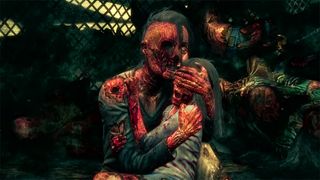
The white phosphorus incident (Spec Ops: The Line)
If you missed Spec Ops, that surprising 2012 gem, the white phosphorus incident occurs when your squad encounters a superior enemy force while en route to an objective. Pinned down and outgunned, the squad resorts to white phosphorus, a real-world incendiary used in mortar shells, grenades, and other weaponry which burns on contact with the air and melts flesh to the bone. After repeatedly shelling the enemy through the lens of a black and white targetting camera, you discover that some of your targets were civilian refugees, packed into a narrow trench where the concentrated phosphorus was impossible to escape and burned them alive.
It might seem cold, calling the horrific deaths of countless innocents beautiful, but beauty is a broad term. It encompasses moments that terrify and disturb us as well as those that enlighten and elevate, and games are uniquely positioned to give us a taste of this nightmare facet of beauty. Watching passively as a horrific act is committed in film or reading about it in a novel is intense, but it doesn't compare to being placed in a situation where you are unwittingly committing those acts yourself. This transgressive sabotage on the part of the developers is beautiful because it exposes the real horror of modern, impersonal war in a way that's deeply affecting, and because of its capacity to shake even the most jaded consumer of violent media. As the cutscene that revealed the civilians charred bodies rolled, I found myself thinking about the detachment of killing real human beings by targeting them on a glass screen the way an operator of a white phosphorus weapon would. I couldn't help but draw a very uncomfortable parallel to the detachment I experience killing fictional people in games, and wonder at how modern military technology is dehumanizing the 'enemy'.
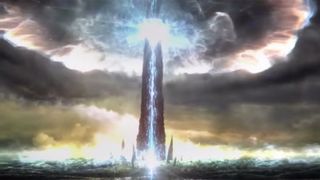
Sacrifice (Fable 2)
Death is one of the most common and effective tropes for wrenching emotion out of an audience, and it's easy to feel exploited as a player/reader/viewer if it's done cheaply or if the emotion the creator is trying to inspire feels unearned. On the flipside, when executed well a character's death can convey so much about the human condition, our connection to others, our inescapable mortality. Fable 2, and the final choice the player makes to sacrifice their beloved dog and family or to trade them for the the lives of countless, faceless thousands, somehow manages to be both: cheap AND effective.
On the one hand, making the culmination of such an epic journey a binary (technically trinary, but no one takes the gold) choice robs it of some dramatic weight. But on the other hand, that choice is a thoughtfully conceived one, and it showcases the sort of decision-making that is so rare in gaming but that makes Fable 2 so outstanding. When I reached this decision myself, I set the controller aside and really pondered. It made me consider how I'd react to this scenario in real life, the 'trolley problem' of video games: would I save a handful of my loved ones at the expense of condemning thousands of innocents to death? Giving players moments like that in a format notorious for its mindlessness is beautiful, yes, but even more importantly it lights the way for video games as a medium to mature.
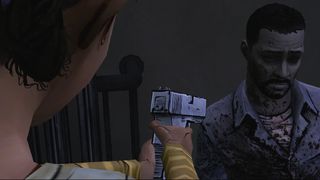
Lee (The Walking Dead)
Courage is beautiful. Sacrifice is beautiful. And yes, tragedy and sorrow are beautiful, or they can be, when they're portrayed with sympathy and skill. Lee's death in The Walking Dead is a master class in all of these, taking a moment that could easily be infuriating, gruesome, or just deeply depressing, and making it instead poignant and powerfully real.
Missing a limb, on the brink of changing into a mindless husk, Lee (and by proxy, the player) must choose whether to suffer a slow, wasting death, or force his doe eyed child ward Clementine to shoot him in the head and end his suffering. After coming through so much in five trying, wrenching, incredible chapters, watching Lee die and pass his survivor's legacy on to Clem is one of the most moving moments in video game history. It's also a moment that could only happen in video games, because it's replete with player choice, the culmination of hours of investing in a character that you're controlling and guiding, who's been your stand-in and avatar, but who simultaneously feels fully realized and very human.
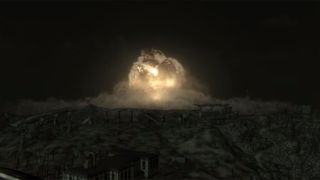
Megaton (Fallout 3)
Megaton, the first real settlement you're likely to encounter in Fallout 3, is a nice little town, as postapocalyptic towns go. The people are mostly friendly, there's work to be had if you want it, and for a little scratch you can find some passable food and a warm bed for the night. Sure, some of the people are quirky, maybe a little gruff, but you'd expect some rough edges given the situation, and there's some real heart in Megaton. And that's exactly why nuking it off the face of the planet is so satisfying.
Blowing up Megaton (with the unexploded nuclear bomb that serves as the town's namesake) is a terrible act, really deeply evil stuff, and there's no amount of rationalizing or equivocating that's going to justify it. But it feels incredible. Watching that mushroom cloud of nuclear fire rise in the distance, knowing that you've forever changed the shape of the Capital Wasteland, is one of the most empowering moments I've ever experienced playing a video game.There's something terrifyingly exhilarating about touching a single button and destroying so many lives and cratering an entire city, and the experience of actually transforming a setting through your actions was still quite novel at the time of Fallout 3's release. Afterwards, of course, there are the faint whispers of regret somewhere in the back of your mind, especially when you see how the town's friendliest resident has been hideously mutated. But in that beautiful moment when the wasteland is darkened by a blast cloud of superheated ash, it's 100% worth it.
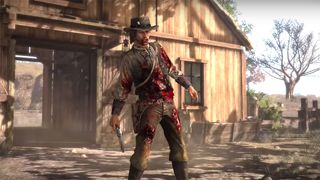
John Marston (Red Dead Redemption)
The end of Red Dead Redemption seems custom made for an article like this. "Is death beautiful?" it seems to ask, as you watch John Marston, father, husband, conflicted antihero, gunned down in a brutal ambush just when he thought he'd escaped his bloody, mercenary past.
Death is beautiful, or it can be, when it's buoyed by grand ideas, when it represents something, when it's not just the futile, empty coda of a wasted life. Or maybe it's beautiful even if it is that latter thing, when it shows us that sometimes life is cruel and banal and happy endings are a fantasy. John Marston's death gives us both, grand ideas like the sharp teeth of the inescapable past and the fact that a violent life is a prison that kills, but also the tragedy of meaninglessness, reaching a goal and finding peace only to discover that it's an illusion concealing the business end of a revolver. Is death beautiful? Yes. But that doesn't make it hurt any less.

Alan Bradley was once a Hardware Writer for GamesRadar and PC Gamer, specialising in PC hardware. But, Alan is now a freelance journalist. He has bylines at Rolling Stone, Gamasutra, Variety, and more.


